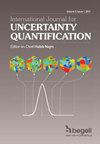工程应用中基自适应稀疏多项式混沌展开的自动选择
IF 1.8
4区 工程技术
Q2 ENGINEERING, MULTIDISCIPLINARY
International Journal for Uncertainty Quantification
Pub Date : 2020-09-10
DOI:10.1615/int.j.uncertaintyquantification.2021036153
引用次数: 13
摘要
稀疏多项式混沌展开(PCE)是一种高效且广泛应用于不确定性量化的替代建模方法,可用于计算量大的工程问题。为了最有效地利用可用信息,提出了几种所谓的基自适应稀疏PCE的方法,以自适应地确定PCE的多项式回归量集(“基”)。本文的目标是帮助从业者确定为他们的模型构建代理PCE的最合适的方法。我们从最近的稀疏PCE文献中描述了三种最先进的基自适应方法,并在大量计算模型的全局逼近精度方面进行了广泛的基准测试。研究稀疏回归解算器和基自适应方案之间的协同作用,我们发现选择合适的解算器和基自适应方案是非常重要的,因为它可能导致性能上的一个数量级以上的差异。没有任何一种方法明显优于其他方法,但是将分析分为类(关于输入维数和实验设计大小),我们能够为每个类识别出表现相对较好的特定稀疏求解器和基自适应组合。为了进一步改进这些发现,我们引入了一种新的求解器和基于交叉验证误差的自适应选择方案。我们证明,就准确性而言,这种自动选择过程提供了接近最优的结果,并且显著地提供了更健壮的解决方案,同时比基准测试获得的逐案建议更通用。本文章由计算机程序翻译,如有差异,请以英文原文为准。
Automatic selection of basis-adaptive sparse polynomial chaos expansions for engineering applications
Sparse polynomial chaos expansions (PCE) are an efficient and widely used surrogate modeling method in uncertainty quantification for engineering problems with computationally expensive models. To make use of the available information in the most efficient way, several approaches for so-called basis-adaptive sparse PCE have been proposed to determine the set of polynomial regressors (“basis”) for PCE adaptively. The goal of this paper is to help practitioners identify the most suitable methods for constructing a surrogate PCE for their model. We describe three state-of-the-art basis-adaptive approaches from the recent sparse PCE literature and conduct an extensive benchmark in terms of global approximation accuracy on a large set of computational models. Investigating the synergies between sparse regression solvers and basis adaptivity schemes, we find that the choice of the proper solver and basis-adaptive scheme is very important, as it can result in more than one order of magnitude difference in performance. No single method significantly outperforms the others, but dividing the analysis into classes (regarding input dimension and experimental design size), we are able to identify specific sparse solver and basis adaptivity combinations for each class that show comparatively good performance. To further improve on these findings, we introduce a novel solver and basis adaptivity selection scheme guided by cross-validation error. We demonstrate that this automatic selection procedure provides close-to-optimal results in terms of accuracy, and significantly more robust solutions, while being more general than the case-by-case recommendations obtained by the benchmark.
求助全文
通过发布文献求助,成功后即可免费获取论文全文。
去求助
来源期刊

International Journal for Uncertainty Quantification
ENGINEERING, MULTIDISCIPLINARY-MATHEMATICS, INTERDISCIPLINARY APPLICATIONS
CiteScore
3.60
自引率
5.90%
发文量
28
期刊介绍:
The International Journal for Uncertainty Quantification disseminates information of permanent interest in the areas of analysis, modeling, design and control of complex systems in the presence of uncertainty. The journal seeks to emphasize methods that cross stochastic analysis, statistical modeling and scientific computing. Systems of interest are governed by differential equations possibly with multiscale features. Topics of particular interest include representation of uncertainty, propagation of uncertainty across scales, resolving the curse of dimensionality, long-time integration for stochastic PDEs, data-driven approaches for constructing stochastic models, validation, verification and uncertainty quantification for predictive computational science, and visualization of uncertainty in high-dimensional spaces. Bayesian computation and machine learning techniques are also of interest for example in the context of stochastic multiscale systems, for model selection/classification, and decision making. Reports addressing the dynamic coupling of modern experiments and modeling approaches towards predictive science are particularly encouraged. Applications of uncertainty quantification in all areas of physical and biological sciences are appropriate.
 求助内容:
求助内容: 应助结果提醒方式:
应助结果提醒方式:


